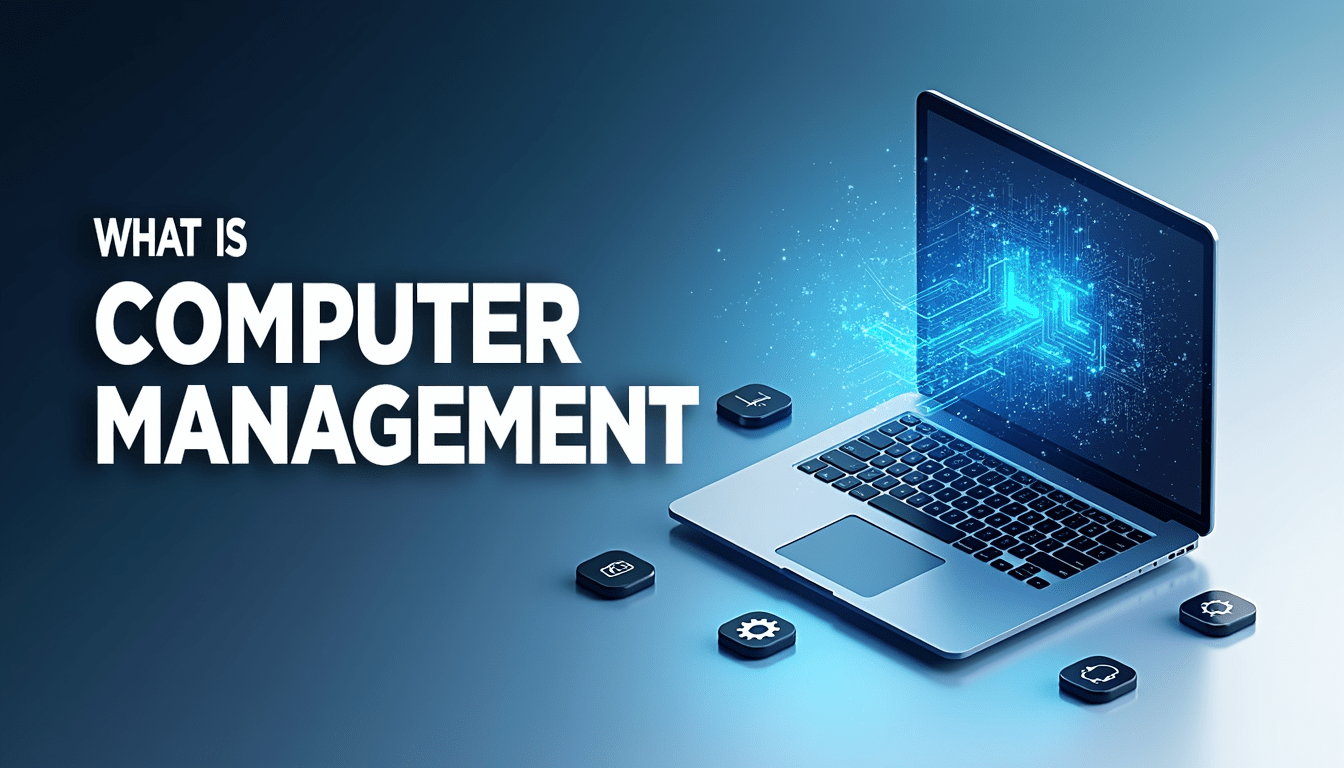What is Computer Management
Are you curious about the ins and outs of computer management? Look no further! In this article, we will break down the concept of computer management and explain its importance in today’s digital landscape. Whether you are a tech-savvy individual or a business owner looking to optimize your IT infrastructure, understanding computer management is crucial.
Computer management involves the supervision and maintenance of computer systems, networks, and software. It encompasses various aspects such as hardware and software inventory, performance monitoring, security updates, and user support. Efficient computer management enhances productivity, ensures data security, and minimizes downtime.
At [Brand Name], we understand the significance of effective computer management for businesses of all sizes. Our expert team provides comprehensive computer management solutions tailored to your specific needs. From system configuration to network monitoring, we’ve got you covered.
Stay tuned as we delve deeper into the world of computer management, sharing valuable insights and best practices to help you navigate the ever-evolving technology landscape. Let’s unlock the potential of your computer systems together! br/>
Importance of Computer Management
Computer management is an integral part of modern businesses and IT environments. Without it, systems can become chaotic, inefficient, and vulnerable to various risks. The importance of computer management can hardly be overstated, as it ensures the smooth operation of IT systems and supports the overall objectives of an organization.
Firstly, effective computer management ensures that hardware and software resources are used optimally. This means that systems are maintained to run at their best performance, and resources are allocated in a way that maximizes productivity and efficiency. By managing these resources well, organizations can avoid unnecessary expenditures on IT infrastructure and benefit from improved system longevity.
Moreover, computer management is essential for safeguarding sensitive data. With the increasing number of cyber threats, maintaining robust security measures is paramount. Through regular updates, patches, and monitoring, computer management helps protect against data breaches and cyber-attacks, thereby maintaining the integrity and confidentiality of critical information.
Key Components of Computer Management
Delving into the key components of computer management, we identify the pillars that support a robust IT infrastructure. These components work together to ensure that systems remain functional, secure, and aligned with business goals.
One such component is hardware management. This involves tracking physical assets, performing regular maintenance, and updating systems to prevent hardware failures. By keeping a detailed inventory, businesses can better plan for upgrades and replacements, ensuring that the hardware meets the evolving demands of the organization.
Another component is software management. This includes the installation, updating, and removal of software applications. Software management ensures that all programs are up to date with the latest security patches and that they are compatible with other system components. It also involves licensing management, ensuring that all software is used legally and efficiently.
The Role of Computer Management in Business Operations
In the context of business operations, computer management takes on a strategic role. It is not merely a technical function but a key contributor to business success. Effective computer management aligns IT resources with business objectives, enabling companies to respond swiftly to market changes and customer demands.
For instance, a well-managed IT infrastructure can lead to improved customer experiences. By ensuring that customer-facing systems are reliable and efficient, businesses can offer better service and enhance customer satisfaction. This, in turn, can lead to increased loyalty and a stronger brand reputation.
Furthermore, computer management plays a critical role in decision-making. Through data analytics and reporting, managers can gain insights into business performance and identify areas for improvement. This data-driven approach enables businesses to make informed decisions and develop strategies that drive growth and innovation.
Common Challenges in Computer Management
Despite its importance, computer management is not without its challenges. As technology evolves, so do the complexities of managing IT infrastructures. One of the most common challenges is keeping up with rapid technological advancements. IT managers must continuously learn and adapt to new technologies to ensure that their systems remain relevant and competitive.
Another challenge is the management of IT security. With cyber threats becoming more sophisticated, organizations must invest in advanced security measures to protect their systems and data. This requires a proactive approach to security, with constant vigilance and quick response to potential threats.
Lastly, there is the issue of scalability. As businesses grow, their IT needs change, and their computer management strategies must evolve accordingly. Ensuring that systems are scalable and can handle increased workloads without compromising performance is a critical challenge for many organizations.
Best Practices for Effective Computer Management
To overcome the challenges of computer management, organizations must employ best practices that ensure their IT infrastructures are robust and agile. One such practice is regular system audits. By conducting thorough audits, businesses can identify inefficiencies and potential security vulnerabilities, allowing them to take corrective actions before issues escalate.
Another best practice is the implementation of a strong IT governance framework. This framework should define the policies, procedures, and standards for managing IT resources, ensuring consistency and compliance across the organization. It also provides a structure for managing IT investments and aligning them with business goals.
Moreover, businesses should invest in employee training and development. With the IT landscape constantly changing, equipping staff with the latest knowledge and skills is crucial for maintaining an effective computer management system. Continuous learning and professional development can also help retain skilled IT personnel, which is vital for long-term success.
Tools and Software for Computer Management
The right tools and software are the backbone of efficient computer management. These solutions streamline various processes and provide the functionalities needed to manage IT infrastructures effectively. For instance, remote monitoring and management (RMM) tools allow IT teams to oversee and control systems remotely, making it easier to manage distributed networks and mobile workforces.
Another essential category of tools is IT service management (ITSM) software. ITSM platforms help organizations manage the end-to-end delivery of IT services, from incident and problem management to change and release management. These tools are designed to improve the IT support experience and enhance service delivery.
Additionally, automated patch management software is critical for maintaining software security. These tools ensure that all applications and systems are up to date with the latest security patches, reducing the risk of vulnerabilities being exploited by malicious actors.
Training and Certifications in Computer Management
For professionals seeking to enhance their computer management skills, training, and certifications are invaluable. These educational opportunities provide the knowledge and credentials needed to excel in the field of IT management. Certifications such as CompTIA’s IT Fundamentals (ITF+), A+, and Network+ lay the groundwork for understanding computer systems and networks.
More advanced certifications, like the Microsoft Certified Systems Administrator (MCSA) or the Certified Information Systems Security Professional (CISSP), dive deeper into specific areas of computer management, such as systems administration and security. These qualifications can open doors to higher-level positions and increase an individual’s value within an organization.
Moreover, ongoing training is essential in keeping up with the latest developments in computer management. Workshops, webinars, and online courses offered by industry leaders ensure that IT professionals remain up to date with new technologies and methodologies.
Outsourcing Computer Management Services
For many businesses, particularly small and medium-sized enterprises, managing IT in-house can be overwhelming. Outsourcing computer management services to specialized providers can be an effective solution. These providers offer a range of services, from basic IT support to complete network management and cybersecurity.
Outsourcing allows businesses to access expert skills and advanced technologies without the need for significant capital investment. It can also free up internal resources, allowing companies to focus on their core operations. Moreover, with the provider handling day-to-day IT management, businesses can benefit from increased operational efficiency and reduced downtime.
However, when considering outsourcing, it’s vital to choose a provider that understands the specific needs of the business. A good outsourcing partner will work closely with the company to develop a tailored strategy that aligns with its objectives and provides the flexibility to adapt as those objectives change.
Conclusion on the Benefits of Proper Computer Management
In the final analysis, the benefits of proper computer management are clear. It enables businesses to operate more efficiently, protect their data, and provide better services to their customers. By investing in the right tools, adopting best practices, and ensuring staff are well-trained, organizations can create a robust IT infrastructure that supports their operations and drives growth.
Whether managed in-house or outsourced, computer management is a critical function that should be given the attention it deserves. As digital technologies continue to advance and become more embedded in our daily lives, the role of computer management will only become more vital. It’s an exciting time for IT professionals and businesses alike, as they navigate this ever-evolving landscape and harness the power of their computer systems to achieve success.
At [Brand Name], we are committed to providing our clients with the expertise and solutions they need to excel in computer management. Unlock the potential of your IT infrastructure and take your business to new heights with effective computer management.




